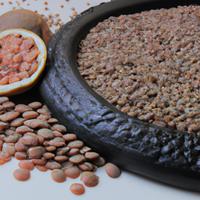
1 serving (100 grams) contains 352 calories, 25.8 grams of protein, 1.1 grams of fat, and 63.0 grams of carbohydrates.

Log this food in SnapCalorie

Nutrition Information
Calories |
704 | ||
|---|---|---|---|
% Daily Value* |
|||
| Total Fat | 2.2 g | 2% | |
| Saturated Fat | 0.4 g | 2% | |
| Polyunsaturated Fat | 0 g | ||
| Cholesterol | 0 mg | 0% | |
| Sodium | 12 mg | 0% | |
| Total Carbohydrates | 126 g | 45% | |
| Dietary Fiber | 21.4 g | 76% | |
| Sugars | 4 g | ||
| protein | 51.6 g | 103% | |
| Vitamin D | 0 mcg | 0% | |
| Calcium | 112 mg | 8% | |
| Iron | 13 mg | 72% | |
| Potassium | 1354 mg | 28% | |
* Percent Daily Values are based on a 2,000 calorie diet. Your daily values may be higher or lower depending on your calorie needs.
Food Attributes
Source of Calories
About Dry grey lentils
Dry grey lentils are small, lens-shaped pulses known for their earthy flavor and creamy texture when cooked. Native to Western Asia and a staple in Middle Eastern, Mediterranean, and Indian cuisines, they are a versatile ingredient in soups, stews, and salads. Rich in plant-based protein, dietary fiber, and complex carbohydrates, grey lentils make an excellent choice for supporting heart health, stabilizing blood sugar, and promoting digestive health. They are packed with essential nutrients like iron, folate, and magnesium while being naturally low in fat and free of cholesterol. As a whole food, they are a fantastic option for vegetarians, vegans, or anyone seeking a nutrient-dense addition to their diet. However, as with other legumes, some individuals may experience digestive discomfort due to their natural oligosaccharide content. Soaking or cooking thoroughly can help reduce this effect, making them a wholesome and nourishing choice for everyday meals.



